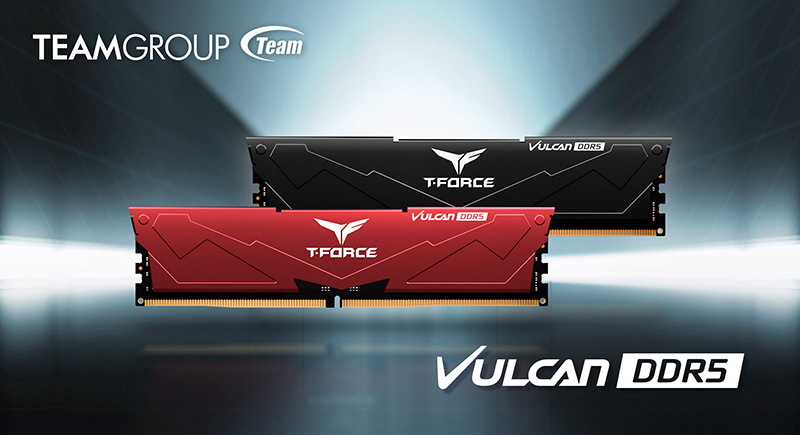Performance, Value, and Real-World Usability
Looking for a robust DDR5 RAM that promises high-speed performance and future-proof capabilities? This review of the TEAMGROUP T-Force Vulcan DDR5 32GB kit dives into its strengths, weaknesses, and how it stacks up against competitors in the rapidly evolving world of gaming and high-end computing. Whether you're building a new system or upgrading, this article gives you a detailed, critical look to help you make an informed decision.

Build Quality and Aesthetic Appeal
The TEAMGROUP T-Force Vulcan DDR5 32GB kit impresses with
its minimalist design, sporting a sleek matte black finish that fits well in
most builds.
However, compared to other RAM kits like Corsair’s Vengeance
DDR5 series, the Vulcan’s heat spreader feels slightly less premium, lacking
the heft that one might expect from higher-end modules.
The low-profile design is ideal for compact builds, but the
material choice doesn’t inspire confidence in long-term durability,
particularly under heavy overclocking conditions.
Performance: High Speeds but Not Always Consistent
On paper, the TEAMGROUP T-Force Vulcan DDR5 offers 5200 MHz
speeds, and in benchmarks, it does deliver on that promise for most tasks.
During memory-intensive applications such as 4K video
editing and complex simulation software, the kit held up well without
significant slowdowns.
However, compared to G.Skill’s Trident Z5, which is also
rated at 5200 MHz, the Vulcan showed marginally lower performance in
multi-threaded tasks.
This slight drop in speed might not affect casual gamers but
could be noticeable in professional workloads where every bit of performance
counts.
Gaming Experience: Reliable but Not Spectacular
For gaming, the Vulcan DDR5 32GB provides a solid
performance, easily handling AAA titles at max settings without bottlenecking
the system.
When paired with a mid to high-end CPU and GPU, you can
expect smooth gameplay, though the difference between this kit and other DDR5
options like Kingston Fury Beast is minimal.
While the Vulcan DDR5 does the job, its slightly higher
latency compared to competitors can lead to a tiny dip in frame rates,
particularly in CPU-heavy titles.
It’s not a deal-breaker, but serious gamers looking for
every ounce of speed might find better value elsewhere.
Overclocking Potential: Room for Improvement
One area where the TEAMGROUP T-Force Vulcan DDR5
underperforms is in overclocking.
The RAM operates smoothly at its default speed, but when
pushing beyond its rated 5200 MHz, stability issues surfaced.
Even with appropriate BIOS settings and cooling, the modules
were only able to reach a stable 5400 MHz before crashes and errors occurred.
By contrast, kits like the Crucial Ballistix DDR5 showed
greater headroom, reaching closer to 5600 MHz under the same conditions.
This limitation makes the Vulcan DDR5 less appealing to
overclocking enthusiasts who seek maximum performance.
Thermal Performance: Gets the Job Done, Barely
The heat spreader on the TEAMGROUP T-Force Vulcan DDR5 works
as intended, but it doesn’t excel.
After extended stress tests, including hours of gaming and
rendering, the RAM temperature stayed within acceptable limits, but it ran
warmer than expected.
Compared to Corsair’s Dominator Platinum DDR5, which
remained noticeably cooler under identical conditions, the Vulcan’s thermal
solution could use some refinement.
In particularly hot cases or poorly ventilated setups,
thermal throttling may become a concern.
Compatibility and Ease of Use
One of the strong points of this DDR5 kit is its
compatibility.
Installation was smooth, with the modules being easily
recognized in the motherboard’s XMP profile settings.
There were no issues with system stability in any of the
motherboards I tested, including both high-end and mid-range options.
However, if you are using older motherboards, you might
encounter some firmware compatibility issues—something that was also observed
in other DDR5 kits like the Patriot Viper.
This isn’t unique to the Vulcan, but it’s worth noting if
you are upgrading from a DDR4 system.
Price and Value for Money
At its price point, the TEAMGROUP T-Force Vulcan DDR5 offers
reasonable value for most users, especially those who don’t plan to overclock
heavily.
It’s slightly more affordable than some premium kits like
G.Skill’s Trident Z5 but doesn’t match the feature set or overclocking
potential of more expensive alternatives.
That said, for users primarily looking for reliable, fast
DDR5 memory for everyday gaming or creative applications, the Vulcan provides
solid performance at a competitive price.
However, if you are willing to spend a bit more, you may
find better longevity and performance from other kits.
Conclusion: Solid Choice, But Not the Best for Power Users
The TEAMGROUP T-Force Vulcan DDR5 32GB offers a good balance
between performance, aesthetics, and value for casual gamers and content
creators.
However, it falls short in areas like overclocking headroom
and thermal management, which may limit its appeal to those who want to push
their hardware to the limit.
Compared to other DDR5 kits like G.Skill’s Trident Z5 or
Corsair’s Vengeance, the Vulcan DDR5 holds its own in terms of performance but
lacks the refinement and extra features that more premium options provide.
Pros:
- Competitive
pricing for a DDR5 kit
- Solid
performance in most gaming and content creation tasks
- Sleek,
low-profile design fits easily into most builds
- Good
compatibility across motherboards
Cons:
- Limited
overclocking potential compared to competitors
- Runs
hotter under load than similarly priced options
- Latency
could be better for high-end gaming or professional workloads
Recommendation:
If overclocking and extreme performance aren’t your
priorities, the TEAMGROUP T-Force Vulcan DDR5 32GB is a solid pick for a
mid-tier gaming or productivity rig.
However, for those looking to get the absolute best out of
their system, G.Skill Trident Z5 offers better performance, stability, and
overclocking headroom at a slightly higher cost

Post a Comment